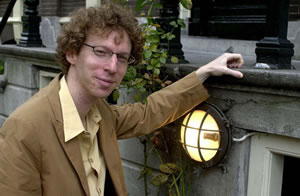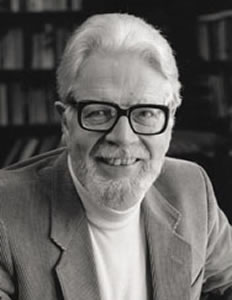De Nederlandse schrijver Arnon Grunberg werd geboren in Amsterdam op 22 februari 1971. Zie ook mijn blog van 22 februari 2007 en ook mijn blog van 22 februari 2008 en ook mijn blog van 22 februari 2009 en ook mijn blog van 22 februari 2010.
Uit: De asielzoeker
„Beck kijkt omhoog naar de asielzoeker, en die knikt hem welwillend toe. Zo van, houd je maar koest, we maken nog wel een echte man van je. Dit is waanzin, denkt Beck, mijn vrouw is waanzinnig, ik ben waanzinnig, de asielzoeker is waanzinnig, mijn leven is honderd procent waanzin geworden. Maar dan verwerpt hij die gedachte. Als je je geluk eenmaal terzijde hebt geschoven veranderen de categorieën, je houdt op je steeds af te vragen wat je eraan hebt, wat je eraan overhoudt, in plaats daarvan onderga je, je leeft voor een doel dat groter is dan je eigen geluk, en daarmee krijgt bijna elke vraag een antwoord, elke situatie zin: voor jou, voor jou, en nog eens voor jou.
Hij noemt het gelatenheid, maar zijn vrouw heeft iets tegen die term, ze vindt hem te negatief. ‘Je laat gaan,’ heeft Beck vaak gezegd, ‘dat is gelatenheid, je legt je neer bij de kracht van het toeval. Er is geen rede, er bestaat geen verband.’
De getuige van de asielzoeker arriveert zonder kloppen. Het is een vrouw, een ondefinieerbaar iemand eigenlijk, Beck kan niet eens haar naam verstaan. Ze heeft cake bij zich, amandelcake in zilverpapier, die ze uitdeelt. Erg vriendelijk, maar Beck had het liever zonder amandelcake doorstaan.
‘Bent u ook een,’ begint de ambtenaar te vragen, maar dan onderbreekt hij zichzelf, kucht even en zegt: ‘U bent ook niet van hier, neem ik aan?’
De vogel knabbelt aan haar stuk cake, maar moet die na een paar happen laten staan. Misselijk is ze de laatste weken, alsof ze zwanger is. Beck klopt de kruimels van haar schoot en legt ze op tafel. Hij wil haar mond schoonvegen, maar ze rukt hem het servet uit handen.
‘Laten we beginnen,’ zegt de ambtenaar. ‘We hebben allemaal nog meer te doen vandaag.’
Beck veegt de nu vrijwel onzichtbare kruimels van de schoot van zijn vrouw. Overbodig, volstrekt overbodig. In de toewijding waarmee hij iedere dag zijn overbodige handelingen verricht schuilt zijn waardigheid.
De ceremonie is kort, maar redelijk aangenaam. De ambtenaar glimlacht een paar keer. Tot Becks verbazing zijn er zelfs ringen. Ze blijken uit een automaat te komen.“

Arnon Grunberg (Amsterdam, 22 februari 1971)
Lees verder “Arnon Grunberg, Paul van Ostaijen, Hugo Ball, Danilo Kiš, Jane Bowles, Ishmael Reed”

